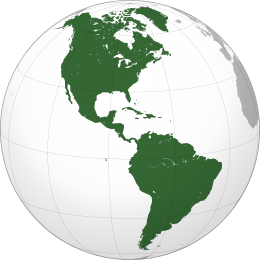More languages
More actions
| The Americas Awya Yala Khéya Wíta Kéyah dah siʼánígíí Ami'ulikaq | |
|---|---|
 | |
| Largest city | São Paulo |
| Area | |
• Total | 42,549,000 km² |
| Population | |
• 2021 estimate | 1,020,000,000 |
The Americas, also known as America, are a landmass in the Western Hemisphere. It is divided into the continents of North and South America.
History[edit | edit source]
Precolonial era[edit | edit source]
Northern America[edit | edit source]
Early civilizations of Pueblo farmers in what is now the Southwestern USA and mound-builders near the Mississippi began around 700 CE but collapsed before European colonization.[1]
Mesoamerica[edit | edit source]
The Mayan civilization in what is now Guatemala and southern Mexico lasted from 300 BCE to 700 CE. It consisted of dynastic, theocratic city-states and developed cities of up to 50,000 people during the Classical period from 300 to 800 CE. The Mayans had advanced astronomy, architecture, and writing but had poor agriculture due to a lack of plows or fertilizer. They fought wars in the name of their kings and sacrificed captives to their gods.
After the parasitic Mayan civilization collapsed, Toltecs from the north took power in central Mexico from 950 to 1170. The Aztecs founded their capital city of Tenochtitlan in 1345 and built an extensive empire between 1428 and 1519 with a large army and a ruling class of priests and warriors. They collected tribute from their subjects and also practiced human sacrifice.[1]
South America[edit | edit source]
The Inca civilization in what is now Peru began expanding in 1197 and reached its greatest extent between 1493 and 1525. It was a centralized and militaristic autocracy with a large administrative bureaucracy.[1]
Geography and climate[edit | edit source]
The Americas run north-south for almost 16,000 km and cross through all climate zones. American crops include maize, potatoes, squash, beans, and manioc. The Americas had llamas, turkeys, and guinea pigs but lacked the large domesticated animals found in Eurasia such as cattle.[1]
References[edit | edit source]
- ↑ 1.0 1.1 1.2 1.3 Neil Faulkner (2013). A Marxist History of the World: From Neanderthals to Neoliberals: 'The Medieval World' (pp. 70–72). [PDF] Pluto Press. ISBN 9781849648639 [LG]
